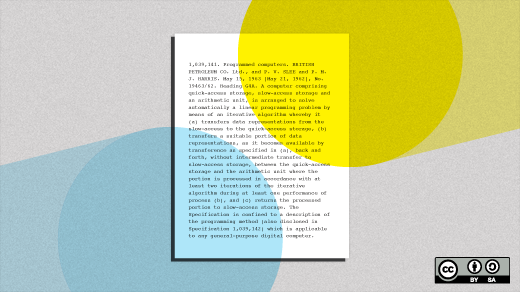I recently wrote about the $4.5 billion auction for Nortel's portfolio of 6,000 patents that went to a consortium that included Apple, Microsoft, and RIM (Blackberry) -- three of four smartphone platforms. In the wake of this sale, Interdigital has contemplated monetizing its portfolio of 8,500 patents, perhaps even putting the company up for sale. Google announced that it has bought over 1,000 patents from IBM for defensive purposes. Perennial investor Carl Icahn suggested that Motorola cash in on some of its immense portfolio of 18000 patents. Analysts have noted that Kodak's patents may be worth more than Kodak itself.
The value of these patents is not in the technology. These prices are being paid for the power to block others from using technology they have developed independently. Or for the power to block others from blocking you by threatening to block them from using their technology -- "assertion" and "counter-assertion."
The IT sector has learned to live with these practices at some cost, but the patent mania and litigation around smartphones is unprecedented. Nothing like this happened as the personal computer came of age. In Silicon Valley, suing for patent infringement was not part of the culture. Knowledge spread quickly and informally. Employees of rival firms socialized and exchanged ideas -- and moved from company to company. The Valley's unique form of social capital beat out the culture of control along Boston's Route 128 and made Silicon Valley world famous.
Too many companies are now embracing legal weapons on large-scale -- and social capital is suffering. Times change. When hearings were held on software patents in 1994, Oracle was vehemently opposed to software patents:
Our engineers and patent counsel have advised me that it may be virtually impossible to develop a complicated software product today without infringing numerous broad existing patents.
That was in 1994. The number of software patents issued annually went up five-fold in the next 15 years to nearly 40,000/year. The number of lawsuits over software patents has gone up eight-fold. Having recently acquired Sun and its vast portfolio of patents, Oracle is suing Google over Android's implementation of Java. Yet when Google adopted Java for Android four years ago, Sun's CEO Jonathan Schwartz blogged about how delighted he was. Oracle recently deleted the posting. And Schwartz's entire blog...
Why now? The opportunities for patent arbitrage, ambush, and hold-up are plentiful and enticing. Businesses, including trolls, are simply exploiting opportunities presented, including the government-created opportunities of the patent system.
Disclosure failure
Paradoxically, in an age where search engines allow free instant access to information, the patent system suffers from massive cognitive failure. We can find a few words among trillions, but we don't know who owns what process. Mission creep has expanded the system far beyond the areas where it works with reasonable precision (molecules) into areas where it generates huge costs and massive uncertainty. Hundreds of thousands of patents are written to secure the broadest possible claims while revealing as little as possible, with dozens of claims per patent to guard against the risk of invalidation while maximizing the opportunities for infringement. Despite the touted goal of public disclosure, these patents are written by lawyers for lawyers. Engineers and developers cope by ignoring patents, a perfectly rational response if they don't want to spend their productive years trying to make sense of tactical legalese.
Yet each patent is a government grant of the power to stop technology and commerce dead. Companies are hauling each other before the International Trade Commission, a federal tribunal that issues automatic exclusionary orders against infringing imports. You just need to show inadvertent infringement of a single inconsequential patent to keep an entire product line out of the U.S. The ITC blatantly discriminates against imports, but global value chains in information technology make all smartphones imports. And with all the innovative things that smartphones do, they face hundreds of thousands of possible patents.
Where does this lead?
More patents, larger portfolios, more and larger aggregators, and bigger markets for patents as weapons against products.
Intellectual Ventures, the shadowy aggregator founded by Microsoft executives, has led the way and now has an estimated 30,000 to 50,000 patents. IV's investors are bound to silence by non-disclosure agreements, and many of its patents are sold to subsidiaries or third parties who can take the rap for patent aggression. IV tried to keep its investors secret but was recently forced to reveal that they included Stanford and Cornell, two of the universities that developed Nine Points to Consider in Licensing University Intellectual Property. Point Eight of these guidelines admonishes: Be mindful of the implications of working with patent aggregators.
Respectable patent aggregation
Backing from prestigious universities puts IV on the verge of respectability. Public universities like the University of Minnesota and the University of Texas System invest in IV, why not public pension funds and other sovereign wealth funds. Why shouldn't governments invest in government-granted rights? After all, the Fed buys treasury bonds.
Last year, France announced the first sovereign patent fund, France Brevets. But France Brevets has only 100 million Euros to play with -- barely 3 percent of the price of the Nortel portfolio. France has since suggested a European patent fund, presumably much bigger. Surely there is a compelling case to be made in light of the post-Nortel frenzy.
But given the debt crisis, perhaps government grants should be left to private investors... Google has some $35 billion in cash equivalents, and a number of commentators have argued that Google should be shelling out cash to protect Android. After all, $35 billion is much larger than the reputed $5 billion capitalization of counter Apple and Microsoft, and keep Android phones coming into the U.S.
But defensive portfolios are utterly ineffective against trolls and despite the conspicuous attacks on Android by Microsoft and Apple, most of the lawsuits are filed by trolls. As for money, Apple has nearly $80 billion in cash reserves, and if it join forces with Microsoft, as in the Nortel auction, that's another $50 billion plus. They can easily outbid Google for abandoned portfolios and failed companies flooding the market. If patents are all about money, $130 billion beats $35 billion any day. Apple/Microsoft wins. Game over.
But as portfolios show real clout, they could look very attractive to sovereign wealth funds that might want to diversify. Shouldn't be controversial. Patents are only property, right? Norway's sovereign wealth fund owns prime real estate in the centers of London and Paris. Having stakes in an aggregator or two looks like a smart strategic investment, especially if it can help ensure access to the lucrative U.S. market.
Talk of real money inevitably turns to China. While China has a $350 billion sovereign wealth fund, China also has currency reserves of $3.2 trillion, up 33 percent in the last year. Like Apple's cash reserves, these are highly liquid assets held for strategic purposes. China's reserves are mostly in U.S. dollars, the world's reserve currency -- and most of that in U.S. Treasury obligations. But how much liquidity does China really need? With patent portfolios looking surprisingly liquid and China's need for access to the U.S. market, why not invest in the "world's currency of innovation?"
What does this look like?
Markets for government granted rights to stop commerce -- in which governments themselves are major players, using government-granted rights to stop others from using government-granted rights to stop commerce...







Comments are closed.